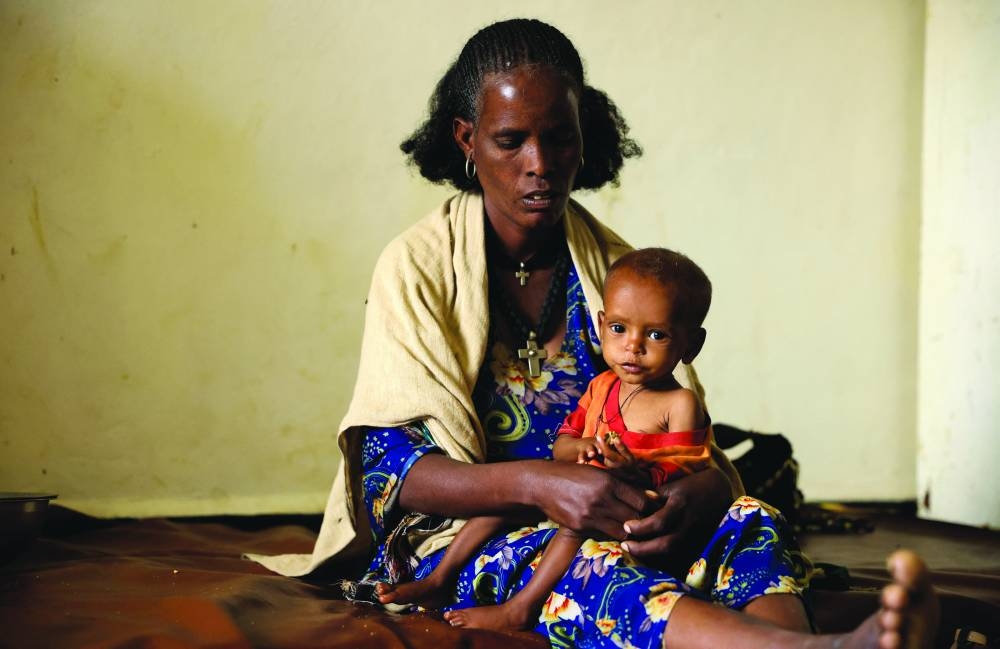Curled up on a hospital bed in Ethiopia’s northern Tigray region, an emaciated little girl struggles to breathe, as her father softly strokes her gaunt face and her mother sits crying.
Tsige Shishay, whose pink sweater reads “beautiful” on the front, is 10 years old but weighs just 10kg (22 lb). Her doctor says she is dying, a new victim of an acute food shortage in a region blighted by two years of war and struggling with drought.
“We are observing her while she is going, which is painful,” paediatrician Dr Teklay Hagos at Ayder Comprehensive Specialised Hospital in Tigray’s capital Mekelle told Reuters. He spoke in English so her parents would not understand.
Staff at Ayder hospital said eight children died in May.
In late June, a Reuters team made their first trip in two years to Tigray, the epicentre of the conflict. On the four-day trip, they toured Mekelle and two towns, Abiy Addi and Samre, visiting a hospital in each place and camps for the displaced.
Guns fell silent after a November ceasefire following two years of fighting between regional forces and Ethiopia’s federal army with its allies, a conflict that drove people from their homes, destroyed harvests and disrupted food aid.
A persistent drought has deepened the problems.
About a fifth of the 6mn people in Tigray were severely food insecure in February, the World Food Programme (WFP) said, in a nation where 20mn people out of a total 120mn population rely on assistance.
Aid flows to Tigray resumed after the November ceasefire but were temporarily halted earlier this year. The WFP and US Agency for International Development (USAID), both major donors, said they had paused flows because some aid was being diverted from those in need.
Ethiopia’s government criticised the halt but said it was investigating the diversion claims. The WFP and USAID said they were working to ensure aid reached the intended recipients and aimed to restart flows as soon as possible. The WFP said it hoped to resume in July.
Gebrehiwot Gebregziaher, a doctor in charge of the Tigray region for the National Disaster Risk Management Commission, said that, starting from April and May, the commission had received reports from several districts and wards in the northwest, east and southwest zones of Tigray of people dying directly or indirectly from hunger. He said 595 people had died so far.
The commission is a federal body that manages the government’s crisis response.
The Ethiopian government spokesperson did not respond to a Reuters request for comment on rising levels of hunger in the Tigray region or the resumption of aid flows to the area.
The president of the Tigray interim administration, Getachew Reda, did not respond but said on Twitter on July 5 he had had talks with WFP officials about efforts to resume aid flows.
In Abiy Addi, about 54km west of Mekelle, the local social affairs office said the town hosted 51,000 people displaced by fighting. Gebremiskel Gidey, an office official who works at a makeshift camp in a local school, said 118 people there were in critical condition due to malnutrition.
“My boy is hungry now, he is asking me to feed him, but I have nothing left,” said Woldesilassie Gebremedhin, a displaced farmer at the school, gesturing to one of his three children.
He said his wife had already died of hunger, adding: “My wish and my prayer are to not see my children dying before me.”

Woletekiros Gebremikael, 28, holds her son, Letemedhin Woldebirhan, 2, severely malnourished due to food aid suspension from the UN World Food Programme and the US Agency for International Development at the Samre Hospital, in Samre, Tigray Region, Ethiopia.
